FMCSA Promotes Controversial Program For Young Truck Drivers
The Federal Motor Carrier Safety Administration is promoting a debatable program on creating a pilot training program that will allow truckers from 18 to 20 to work between states.
Now, only truck drivers over 21 years old have the right to transport goods across state lines.
In November 2021, almost a dozen U.S. Senators filed a request to the FMCSA to lower the age for truck drivers working in interstate commerce in response to growing supply chain and workforce problems.
In a notice posted to the Federal Register on Friday, January 7, the FMCSA asked for “emergency approval” for a request to collect information required to initiate a pilot training program for truck drivers under 21 years old.
The training program for truckers under 21 years old was included in the $ 1,2 trillion Infrastructure and Jobs Investment Act, signed in 2021. The law required the FMCSA to begin a pilot program within 60 days of the signing the Infrastructure and Jobs Investment Act.
The FMCSA is asking the White House Office of Management and Budget (OMB) to pass the request by January 13, 2022.
Once approved, the pilot training program will last for three years. During the program, interns will undergo two trial periods during which they can only work in interstate commerce under the supervision of an experienced drivers in the passenger seats.
The first probationary period must include at least 120 hours of standby time, of which at least 80 hours must be spent driving.
To pass this probationary period, the employer must define competence in:
1. Interstate highway, city traffic, rural two-lane and driving in the evening;
2. Security awareness;
3. Space and speed control;
4. Lane control;
5. Mirror scanning;
6. Right and left turns;
7. Registration and observance of the rules regarding working hours.
The second probationary period must include at least 280 hours of standby time,
including at least 160 hours of driving in the CMV. To pass this probationary period, the employer must define competence in:
1. Backing and maneuvering in close combat;
2. Pre-trip inspections;
3. Fueling procedures;
4. Cargo weighing, weight distribution and sliding tandems;
5. Connection and disconnection procedures;
6. Trip planning, truck routes, map reading, navigation and permits.
After completing the second probationary period, the student can begin to drive vehicles in interstate commerce without being accompanied by an experienced driver.
Road transport companies participating in the pilot program are required to submit data according crashes, inspections and safety to the FMCSA on a monthly basis.
You can click here to submit your public comment on the pilot by January 13th.




